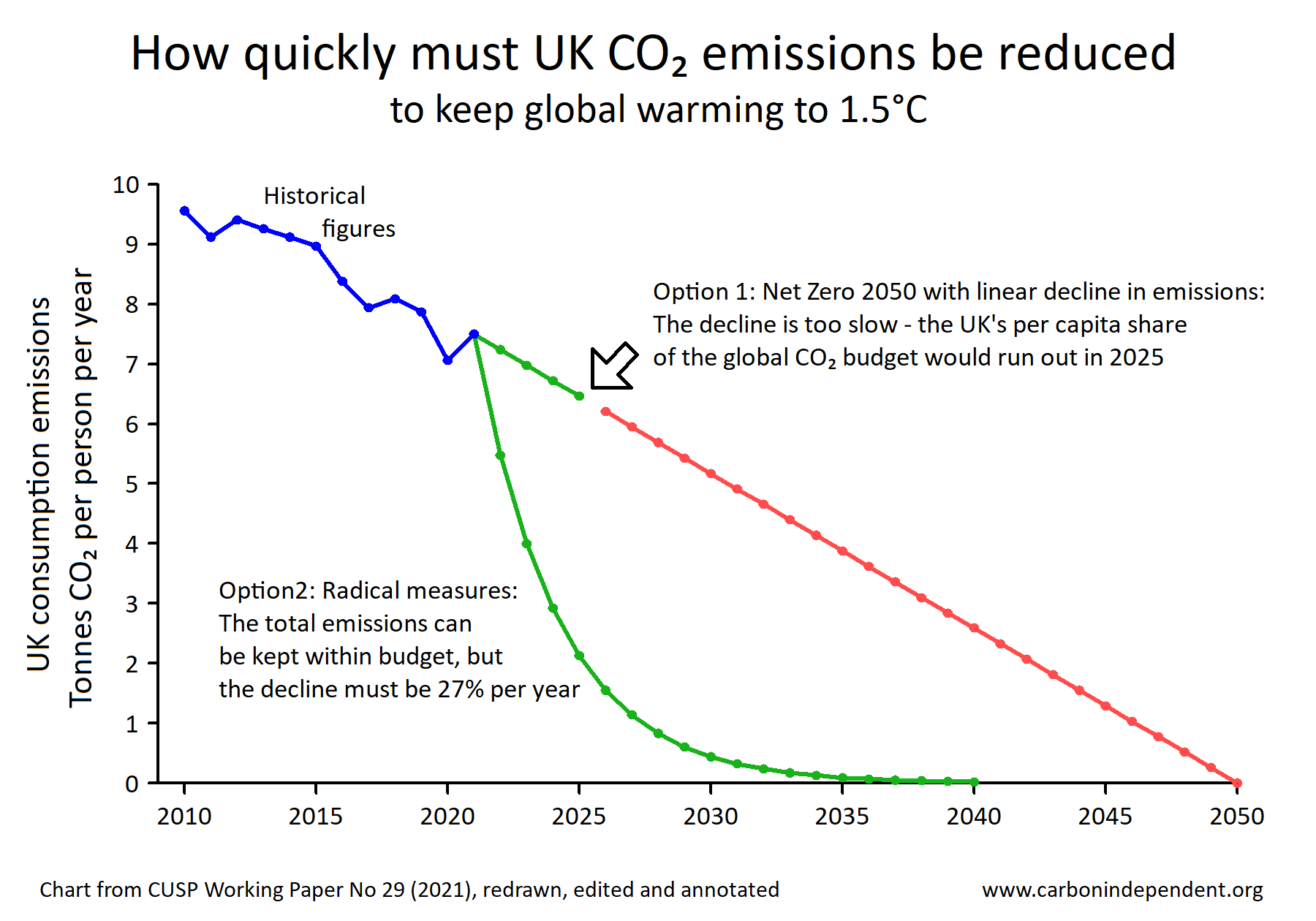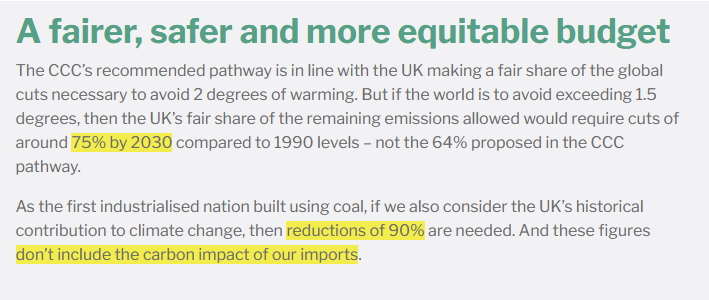
Friends of the Earth: Climate denial: Court cases 2022-25
Friends of the Earth is knowingly misleading its members and the wider public about the urgency of action in the climate emergency.
In paticular, it is endorsing the UK Government's Net Zero 2050 timescale of target emission cuts, whereas according to the scientific consensus, the timescale is at least three times too slow. Instead of the Net Zero 2050 strategy, urgent radical emission cuts are needed.
Friends of the Earth is contradicting and undermining the IPCC, and the climate scientists, economists and campaigning groups who are trying to publicise the need for urgent radical cuts in emissions.
Friends of the Earth is engaging in implicatory climate denial.
Friends of the Earth needs to revise its messaging if it is to accurately inform its members and the wider public about the seriousness of the climate emergency.
Friends of the Earth (FoE) (https://friendsoftheearth.uk) is the UK's largest grassroots environmental organisation.
One example of its messaging is the 2022 and subsequent High Court legal cases, which are discussed on this web page.
A second example of its messaging is its response to a key government report - see Friends of the Earth: Climate denial 2: Response to CCC annual report 2023 at document 164.
The 2022-25 Friends of the Earth High Court cases
FoE, in conjunction with two other organisation (Client Earth and the Good Law Project), brought a High Court case in 2022 that the UK Government's climate strategy did not contain sufficient detail for it to achieve its target reductions. The verdict was given in July 2022 and was in favour of FoE and its partners, and the UK Government has had to revise its strategy. All three organisations celebrated the verdict as a success without qualification (the FoE Press release is at https://friendsoftheearth.uk/climate/govts-climate-strategy-deemed-unlawful-historic-ruling), and have used it in their mailings to supporters to appeal for more funding.Further court cases are continuing.
How much of a success was the 2022 High Court case?

If the UK Government's timescale for emission cuts was acceptable, then the 2022 case would be a success. But the timescale of cuts is over three times too slow since it would take three times the UK's per capita share of the residual global CO2 budget for 1.5°C - as shown in the chart above (taken from the report from the Centre for the Understanding of Sustainable Prosperity at Surrey University [1]) and document 109.
So even if the UK Government revises its strategy to include sufficient measures to meet its targets, the strategy would still be unacceptably flawed because the targets are wrong.
Friends of the Earth and its partners are endorsing the wrong targets.
Contradiction of the IPCC and others
The UK Government's Net Zero 2050 strategy is based on a process of gradual deconarbonisation (the "gradual decarbonisation" fallacy - see document 142), but this is not in accord with the scientific consensus, which is that urgent radical cuts in emissions are needed.This scientific consensus is being promoted by
- the IPCC: "unless there are immediate rapid and large-scale reductions in greenhouse gas emissions, limiting global warming to 1.5C will be beyond reach" [2]
- climate scientists e.g. those at the Tyndall Climate Centre [3] and Peter Kalmus
- economists e.g. Prof Julia Steinberger and Prof Tim Jackson [1]
- youth climate activists e.g. Greta Thunberg: "It will take drastic annual emission cuts unlike anything the world has ever seen" [4]
- other campaigners including Extinction Rebellion.
FoE and its partners are contradicting and undermining these in their messaging via their mailings to their members and their press releases.
The need for consistency
Inconsistent messaging can mean that the public does not know who to believe or believes the wrong message.Messaging that is inconsistent with the scientific consensus has been identified as a barrier that is delaying the radical action needed [5]. In response to this problem, Scientists for Global Responsibility (SGR) has launched its Science Oath for the Climate [6], which commits signatories to
"explain honestly, clearly and without compromise, what scientific evidence tells us about the seriousness of the climate emergency..."
and
"speak out about what is not compatible with the commitments, or is likely to undermine them".
The contradiction of the IPCC is intentional rather than inadvertent
Friends of the Earth is aware that the UK Government's emission reduction targets are not consistent with the climate science - it has said so in its own documents. For example, a 2021 FoE analysis [7] explained the need for emission cuts of over 90% by 2030 (see excerpt).
For example, a 2021 FoE analysis [7] explained the need for emission cuts of over 90% by 2030 (see excerpt).Concerns have also been repeatedly brought to its attention - but FoE continues to endorse and promote the Government's inadequate targets.
It is thus knowingly contradicting the IPCC, and knowingly misleading its members and the wider public.
Implicatory denial
Friends of the Earth is not denying the facts on climate change, or how they should be interpreted. It is the implications of the facts that is being denied. This is an example of implicatory denial, according to Stanley Cohen's description of the different forms of denial - see document 147.Comment
There is a cacophony of inconsistent messaging about what needs to be done about climate change. FoE and its partners are adding to this.If FoE and its partners want to support the UK's adherence to the Paris Agreement and efforts to contain global warming to 1.5°C, they should
- make a commitment to
explain honestly, clearly and without compromise, what scientific evidence tells us about the seriousness of the climate emergency...
similar to SGR's Science Oath for the Climate (see above) - publicise the speed of cuts required, as indicated by:
- "immediate rapid and large-scale reductions in greenhouse gas emissions" as advised by the IPCC [2]
- the Tyndall Centre reports for UK local authorities showing that annual emissions cuts of typically 13% were needed in 2019 [3], with faster cuts now being needed because of the lack of action.
The nature of these comments
The points made on this page might be seen as hostile criticism, but that is not how they are intended. All three organisations do some excellent work, and so lapses should be brought to their attention, and (if necessary) to the public's attention.The comments made here are intended as "critical friend" feedback, analogous to peer review, as part of the process of policy science, working towards a robust evidence-based consensus on what needs to be done.
Climate urgency denial is a major barrier to progress on climate change (see document 50) and so climate urgency fallacies should be identified and eliminated.
Related pages
Client Earth: Climate denial - see document 149.References
| [1] | Jackson T (2021) Zero Carbon Sooner: Revised case for an early zero carbon target for the UK. CUSP Working Paper No 29. Guildford: University of Surrey. https://cusp.ac.uk/wp-content/uploads/WP-29-Zero-Carbon-Sooner-update.pdf |
| [2] | Abdalah Mokssit (Secretary of the IPCC) (Aug 2021) IPCC press conference https://un-spbf.org/event/ipcc-press-release-climate-action-cannot-wait/ |
| [3] | Tyndall Centre The Tyndall carbon budget tool (2019) https://carbonbudget.manchester.ac.uk/reports/ |
| [4] | Greta Thunberg speech, Milan (Sep 2021) https://www.carbonindependent.org/119.html |
| [5] | Turning delusion into climate action - Prof Kevin Anderson, an interview (2020) Responsible Science https://www.sgr.org.uk/resources/turning-delusion-climate-action-prof-kevin-anderson-interview |
| [6] | Scientists for Global Responsibility. A science oath for the climate: text and signing (2020) https://www.sgr.org.uk/projects/science-oath-climate-text-and-signing |
| [7] | Friends of the Earth (2021) Faster, deeper and fairer carbon pollution cuts needed https://policy.friendsoftheearth.uk/insight/faster-deeper-and-fairer-carbon-pollution-cuts-needed |
First published: 28 Jul 2022

 ✖
✖